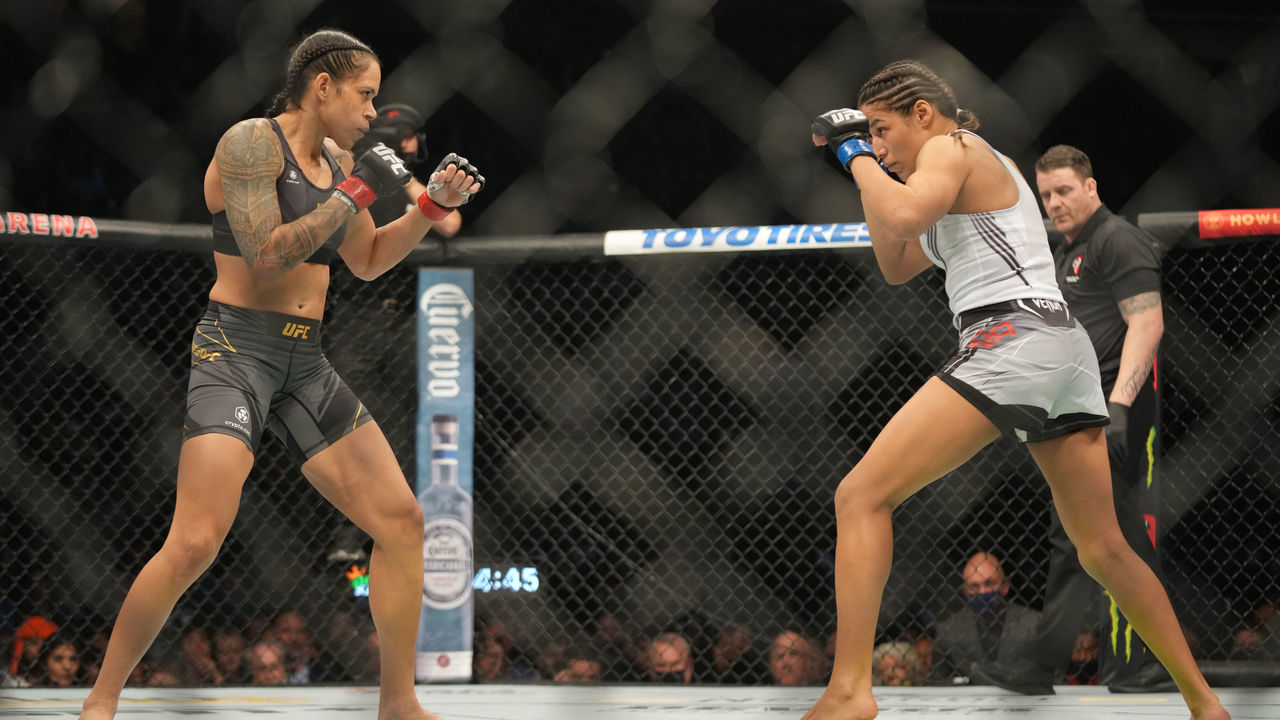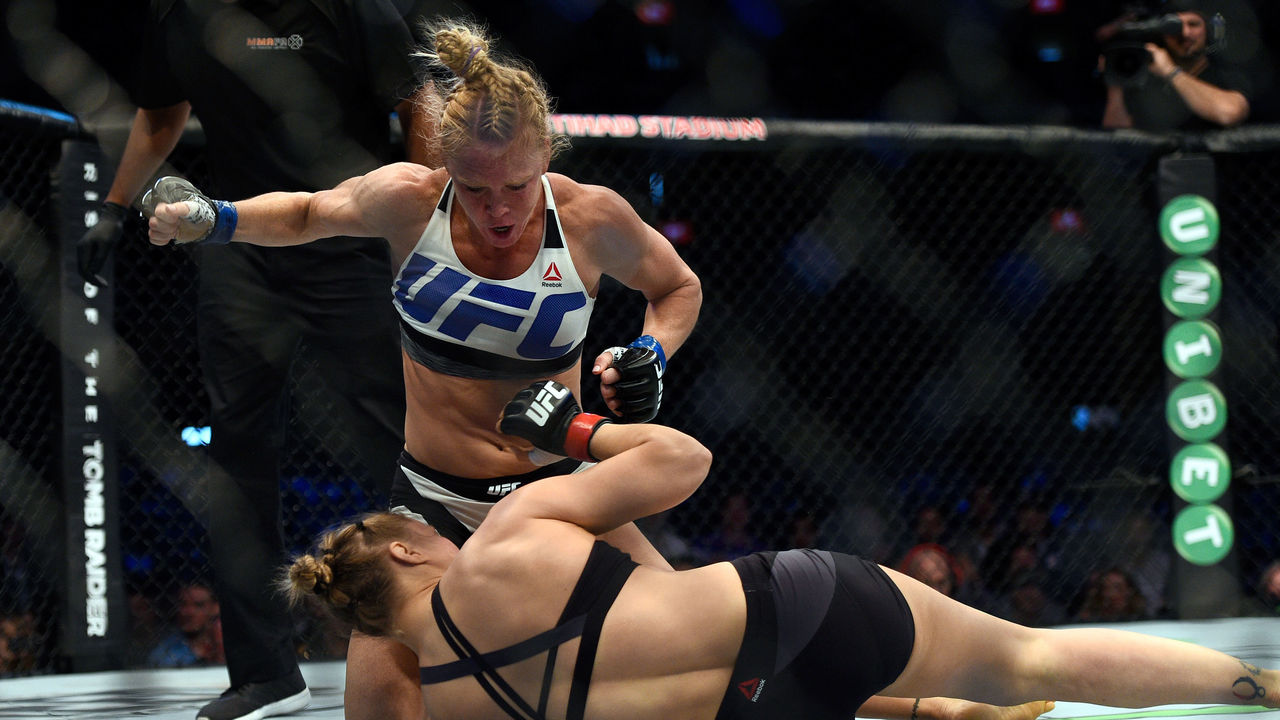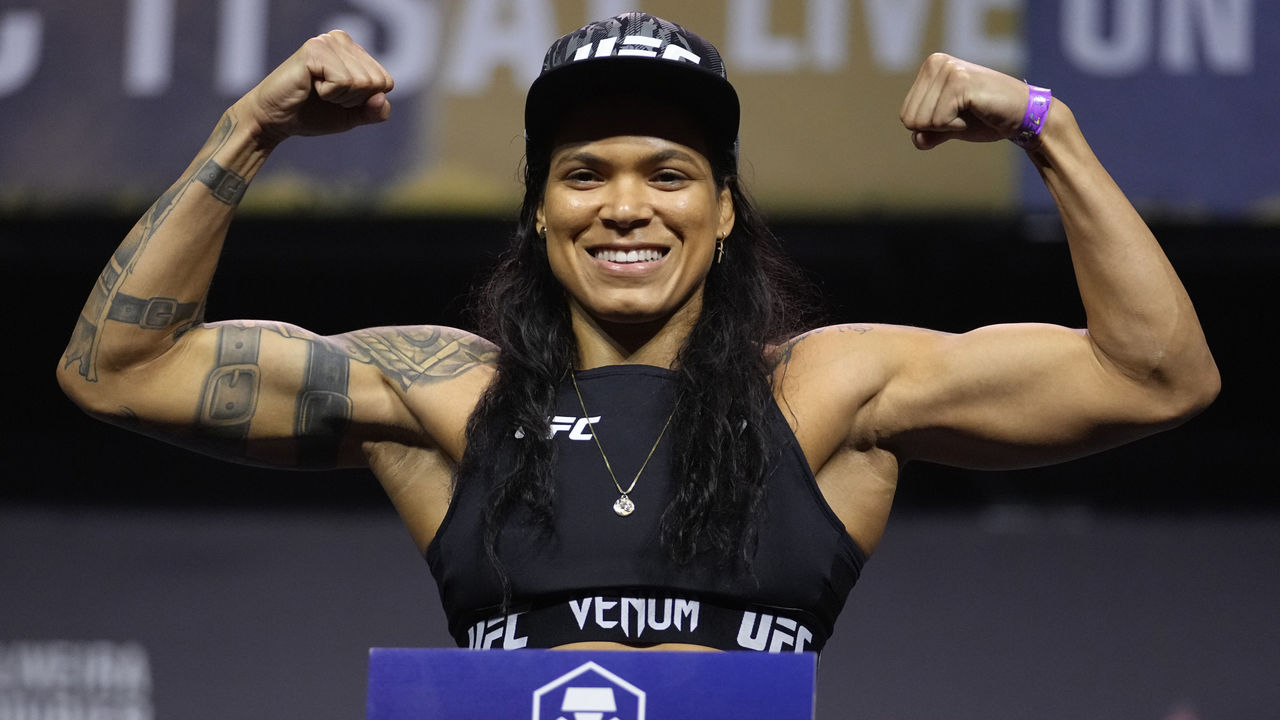Why Pena-Nunes is the biggest upset in UFC history
Editor's note: This story was originally published Dec. 13, 2021, two days after Julianna Pena defeated Amanda Nunes at UFC 269 to win the women's bantamweight title. Pena and Nunes are scheduled to meet in a rematch at UFC 277 on July 30, 2022.
When Julianna Pena choked out Amanda Nunes to win the UFC women's bantamweight title Saturday, I, like the entire MMA world, was blown away. A million thoughts raced through my mind, and it was hard to process what I'd just watched.
When the sport produces a result as incredible as this one, whether it's a brutal knockout, an astonishing comeback, or a back-and-forth slugfest, the discussion afterward is often centered around where that fight stands in MMA history.
So, as one does, after UFC president Dana White wrapped the belt around Pena's waist with a smirk on his face, I immediately started to think about where her victory over Nunes ranked among the biggest UFC upsets of all time.
At first, I said top three - it'd be flat-out wrong to rank it any lower than that - but not quite the biggest. I didn't want to be too reactionary and let recency bias get the best of me. We tend to do that in MMA far too often, especially with a big knockout or an exciting fight. Pena's submission was truly unexpected, but more so than a couple of the other insane results we've seen over the years?
But then I considered it some more. I thought about each aspect of this bout and the other candidates. And I reached a different conclusion: Pena's second-round submission of Nunes is, in fact, the biggest upset in UFC history.

Before this past weekend, the list of biggest UFC upsets included: Matt Serra def. Georges St-Pierre, Holly Holm def. Ronda Rousey, Michael Bisping def. Luke Rockhold, TJ Dillashaw def. Renan Barao 1, and Rose Namajunas def. Joanna Jedrzejczyk 1.
The big two were Serra-GSP and Holm-Rousey. Those were in a league of their own. So, those are the upsets we'll focus on and compare to Pena-Nunes.
Let's start with Serra-GSP. Serra joined the UFC in 2001 and put together a meager 4-4 record in his first eight fights. Following his UFC release, he was given an opportunity to compete on "The Ultimate Fighter: The Comeback," which gave former UFC fighters a second chance.
As the season's welterweight winner, Serra earned a shot at St-Pierre's title. He knocked out St-Pierre at UFC 69 in 2007 to become the new champion.
Serra over St-Pierre is likely still the biggest skill gap a challenger overcame in a UFC title fight. But what puts this upset just behind Pena-Nunes is the fact that St-Pierre wasn't yet established as a dominant champion.
St-Pierre - who avenged the Serra loss in a rematch a year later - is today considered one of the greatest fighters of all time, but that wasn't the case in 2007. The Quebec native had fought in the UFC nine times, going 8-1, and he'd just become the welterweight champion. Serra was his first challenger.
Think about all of the wins that made St-Pierre one of the best ever: Josh Koscheck, Carlos Condit, Bisping (for the middleweight title), Jake Shields, Thiago Alves, the BJ Penn stoppage, the second Matt Hughes win. All of those happened after Serra knocked him out. At the time of that defeat, St-Pierre was a promising, 25-year-old titleholder, but his all-time greatness came later.
And then there's Holm-Rousey, the biggest upset in women's MMA before Saturday. Unlike Serra-GSP, this one was shocking more so because of Rousey's dominance rather than Holm's ability. Rousey, the biggest star in MMA at the time, was 12-0 and had successfully defended the women's bantamweight title six times. Five of those wins came in the first round, three in under a minute, and two in 16 seconds or less.
Ronda Rousey fights were spectacles - people tuned in to see how long they'd last.
So, of course, when Holm, 2-0 in the UFC at the time, marched into the Octagon at UFC 193 in 2015 and knocked out Rousey in the second round, it was a huge surprise. Rousey was one of the first names that came to mind when you thought about a UFC champion with the best chances of retiring undefeated because she appeared to be far ahead of her competition. A head kick from Holm put an end to that notion for good.

However, even without the benefit of hindsight, there are several reasons why Holm-Rousey wasn't as big of an upset as Pena-Nunes. Before making a name for herself in MMA, Holm was a world boxing champion and professional kickboxer; some consider her one of the best female boxers ever. If she was able to keep the Rousey fight on the feet, Holm would be at an advantage - she had a clear path to victory.
Furthermore, Rousey hadn't fully proved herself. Most of her fights ended in quick submissions - specifically, armbars. She never went the full five rounds in her entire professional MMA career. In fact, she never made it past the third round. We never got to see Rousey's striking technique over longer periods of time; she overwhelmed Bethe Correia and Alexis Davis for TKOs in under a minute, but that was it.
Rousey had flaws. We just didn't see them until the Holm fight. But it was still naive of us to think she couldn't be beaten.
Pena-Nunes checks all the boxes that Serra-GSP and Holm-Rousey don't.
Before the loss to Pena, Nunes established herself as the consensus greatest women's MMA fighter of all time. She beat Miesha Tate for the bantamweight title in 2016 and defended it five times, including against current women's flyweight champion Valentina Shevchenko, Holm, and former women's featherweight champ Germaine de Randamie. Nunes also captured the featherweight belt with a 51-second finish over Cris Cyborg in 2018 and twice defended that title, which she still holds. The fact that Pena took out the GOAT has to carry some weight.
Another key factor that makes Pena-Nunes the biggest upset is that Nunes is well-rounded. She can submit you, she can knock you out, and she can outpoint you over 25 minutes. Need proof? Nunes did all of that during her time as UFC champion alone. She is elite in every area of MMA, and she's used all of her tools in the cage. Her dominance was much different than Rousey's in that regard.

On paper, Pena had no clear path to victory against Nunes. The prevailing wisdom was that Nunes was by far the better striker and that she might hold a slight advantage on the ground, too, despite the fact that Pena is known for her wrestling. No fighter is invincible, and anything can happen in MMA, but it sure didn't seem like Pena's particular skill set would be what finally slayed "The Lioness."
The icing on the cake is the fact that Nunes - who'd never once been in trouble in a title fight before Saturday - is still in her prime. This wasn't Nunes in her late 30s after a lengthy career full of absorbing damage. There were no signs that Nunes was slowing down - we still don't know if she is or not - or that the gap in skill between the Brazilian and her opponents was getting smaller. Her results in the cage didn't show that. In fact, Nunes was coming off two of the easiest wins of her title reign.
Nunes was a longtime champion, unlike St-Pierre. She was elite everywhere, unlike Rousey. Pena had no obvious path to victory, unlike Holm. And Nunes was in her prime.
Still, she lost.
Serra defeating St-Pierre and Holm defeating Rousey are iconic upsets that will live on forever, but Pena's submission of Nunes at UFC 269 has to be considered the biggest yet.